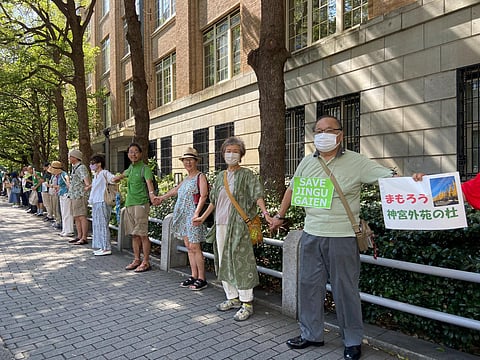Protesters demand that Japan save 1000s of trees by revising a design plan for a popular Tokyo park
TOKYO: Protesters in Tokyo formed a human chain Sunday to demand the government save thousands of trees by revising its plan to redevelop a popular downtown park.
Demonstrators, many wearing green shirts and holding up signs saying, “Save Jingu Gaien," demanded the Education Ministry take action even though the landowner is one of its agencies.
Tokyo Gov. Yuriko Koike approved the plan in February, a move that would allow developers, real estate company Mitsui Fudosan, Meiji Jingu shrine, Itochu Corp. and the ministry-affiliate Japan Sports Council, to build a pair of 200-meter (650-foot) skyscrapers and an 80-meter (260-foot) tower.
That would require cutting down nearly 3,000 trees at Jingu Gaien, one of Tokyo's most historic and beloved green areas. The plan would also raze and rebuild a historic baseball stadium where Babe Ruth played and change a rugby field to one with artificial grass.
Also at stake are the well-known 150 gingko trees lining a century-old promenade built to commemorate Emperor Meiji, the great-grandfather of Emperor Naruhito. Critics and environmental activists say the gingko trees will be under threat from any construction right next to them.
“I just had to come and do something to stop tree-cutting that could start this month,” said Nahoko Shirakawa, holding a handmade sign. “I cannot just sit around and see the demise of 100-year-old gingko trees.”
Rochelle Kopp, a movement leader who operates a Tokyo management consulting company, said the ministry should protect the Gaien as a natural cultural heritage site. She said the ministry also should designate the area as a scenic site as a way of protecting it.
Sunday’s protest came after a United Nations-affiliated conservancy issued a “heritage alert” for Tokyo's Gaien area. A senior member of the International Council on Monuments and Sites, or ICOMOS, said Friday that the plan goes against a global fight against climate change and raised questions of transparency around the decision-making process.
“ICOMOS regards this as an irreversible destruction of cultural heritage,” Elizabeth Brabec, head of the organization's International Scientific Committee on Cultural Landscape, told a news conference.
“Beyond that," she added, the plan is "an unacceptable loss of open space and mature heritage trees at a time when the world responds to climate change (and) recognizes the critical importance of maintaining urban open spaces and all parts of the urban forest.”
Brabec noted that some of the trees are 50-100 years old. She said the heritage they represent can never be replaced with the planting of new trees. “It is virtually unheard-of for a major city such as Tokyo to take some of its urban parkland, which is in very short supply, and convert it to development."
Work to cut down the trees could begin later this month.
Koike told reporters Friday that her government has urged the developers to revise the plan before they start cutting down the trees. She said the revision they promised in January has not been submitted.
ICOMOS is asking Koike's Tokyo Metropolitan Government and the developers to respond to its alert by Oct. 10.
Developers have argued that the Jingu baseball stadium and rugby venue cannot be renovated and must be razed. The organization also urges Meiji Jingu to withdraw from the redevelopment project, saying the Jingu Gaien was created by citizens who volunteered to provide labor to make the park.
The protests led by civil groups have drawn mounting support not only from area residents but also from prominent people, including Japanese novelist Haruki Murakami and dozens of academics, writers and architects.
“I just cannot tolerate the loss of the wonderfully designed baseball stadium,” said a nursery teacher Ayako Kato, a fan of the Yakult Swallows, whose home turf is Jingu Stadium. “We need to save not only the stadium (but also) our culture that comes with watching the baseball here.”

